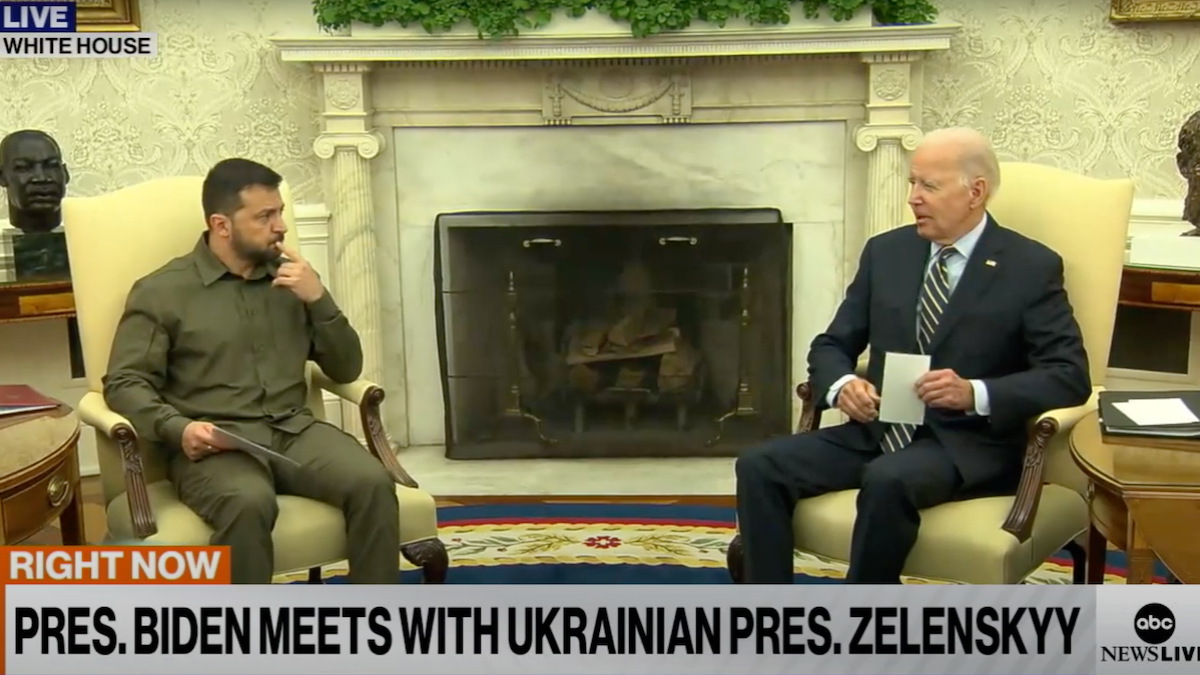The Heritage Foundation is under fire again for failing to say and do exactly what establishment neocons want regarding U.S. funding for Ukraine. This time, the think tank’s crime is — I’m not kidding — being quoted in Russian media.
If America’s foes quote critics of the Biden administration, that apparently means those critics are wrong and their objections to Biden’s policies can be dismissed. So goes the thinking, anyway, of National Review’s Jim Geraghty, who devoted an entire column to making this asinine argument on Friday.
Here’s the background. Back in August, Heritage said the federal government should prioritize helping Americans recover from natural disasters like the Maui wildfires instead of funding a grinding war of attrition between Ukraine and Russia. In an op-ed, Heritage President Kevin Roberts noted the Biden White House was trying to sneak yet more Ukraine funding into a bill that would add money to FEMA’s depleted Disaster Relief Fund (DRF), rightly calling it an underhanded, back-door trick to advance an unpopular policy.
After the op-ed ran, Heritage followed it up with a short video making the same point: that the White House was trying to “hold hostage” disaster aid, and that “until Joe Biden offers a plan to end the war, Congress shouldn’t approve another cent.” (That’s a view, by the way, a plurality of Americans now share, while a supermajority say there should be a “time limit” for Ukraine aide, according to a recent Gallup poll.) The 30-second spot also made the entirely fair point that total U.S. funding for Ukraine, about $113 billion at the time, amounts to about $900 for every American household.
It was that last part, about the $900 per family, that really got the establishment types riled up — especially at National Review. Jay Nordlinger was positively outraged, declaring Heritage to be a “moral obscenity,” while Dominic Pino penned a pair of pieces trying simultaneously to debunk the $900 figure and insist it doesn’t matter because Ukraine aid is a drop in the bucket compared to other federal spending. (Pino also argued, rather comically, that a lot of U.S. aid to Ukraine ends up lining the pockets of defense contractors, “which employ Americans and contribute to U.S. economic output,” as if funding the Ukraine war is tantamount to a U.S. jobs program, or a tool to fix the country’s industrial base.)
Having vented their frustrations with Heritage, the staff at National Review let the matter rest a while. But on Friday, Geraghty found a new cause for complaint. Heritage’s $900 talking point, it seems, has been “frequently quoted on propaganda sites run by the Russian government and Putin’s allies.” How frequently? Three times, according to an unnamed friend of Geraghty’s who monitors Russian media.
You might be thinking, so what? Heritage has no control over who quotes them, and anyway of course Russian state media will quote domestic critics of the Biden administration. They quote right-of-center U.S. media coverage of Biden’s border crisis all the time, why wouldn’t they do the same with critics of Ukraine funding? Just because bad actors latch onto an argument for their own purposes doesn’t invalidate the argument.
Geraghty begs to differ. He thinks Russian state media quoting Heritage is somehow a scathing indictment of the think tank. Not that it means the people at Heritage are “bad folks,” he’s quick to add (with the exception of Daily Signal Executive Editor Rob Bluey, at whom Geraghty directs some juvenile and needlessly personal insults in a bizarre, cringe-inducing footnote), it’s just that they’re Russian dupes. He concedes the obvious point that the foundation can’t control whether Russian state media quote them or in what context. “But if Russian state media is quoting you, it’s probably a sign that you’ve overshot the normal fair-minded range of debating U.S. policies, and strayed, perhaps inadvertently, into the territory of giving Putin’s regime useful fodder.”
Get that? Questioning unconditional, unlimited U.S. funding for Ukraine is outside “the normal fair-minded range of debating U.S. policies.” And Geraghty’s proof, to the extent he offers any, is simply that three Russian state media outlets cited a Heritage talking point.
What a ridiculous argument. Never mind that it’s patently not true that Heritage has overshot the “normal fair-minded rage of debating U.S. policies” — a phrase that screams “controlled opposition.” After all, more than 40 percent of Americans agree with Heritage and say we’re doing too much for Ukraine (compared to the 25 percent who say we’re not doing enough). The larger problem with Geraghty’s non-argument is that being quoted by some other outlet, especially a state-run media shop, isn’t evidence of anything at all.
You’d think a writer for National Review would realize the folly and hypocrisy of such a claim. But no. Geraghty says if he ever wrote something that was quoted by Russian state media, he’d want to take a shower. Well then suds up, pal. Since 2018, Geraghty has been quoted at least five times by the state-run Russian television news network RT (here, here, here, here, and here) on topics ranging from intel leaks during the Afghanistan withdrawal, to social media censorship, to “Blade Runner” as an instruction manual for tyranny.
Not that Geraghty is special in this regard. RT is constantly talking about what NR writers have said, even on Ukraine. Here’s an RT post from June quoting Michael Brendan Dougherty, one of the few Ukraine war skeptics at NR, about low morale in the Ukrainian armed forces possibly causing problems in the planned counteroffensive (which never really materialized, so maybe Dougherty was on to something there). It seems RT has quoted or amplified National Review’s criticism of Biden and the Democrats hundreds if not thousands of times over the years, which is probably also true of every right-of-center publication that has been critical of the Obama and Biden administrations.
Do you know what that proves? Absolutely nothing. And only the most craven, dishonest hack would claim otherwise.
Yet Geraghty, who didn’t bother to check whether he’d ever been quoted by Russian state media before besmirching Heritage for the same, seems to think that if Moscow amplifies conservative criticism of Biden’s Ukraine policy, it means the critique itself is automatically wrong. He asserts this without even trying to engage the substance of Heritage’s argument — that the Biden administration has no end-game strategy for the war, has failed to make the case that indefinitely funding the conflict serves the U.S. national interest, and that additional funding should be tied to a clear strategy and concrete goals.
The strange thing is, it wouldn’t be that hard to engage this argument. Other neocon establishment types have, even if no one has very rigorously defined what a plausible Ukrainian “victory” would look like or what it might entail — and no, “until all Russian troops are expelled from all Ukrainian territory” doesn’t count. But Geraghty doesn’t even try. Instead, he lobs out this lazy, hypocritical guilt-by-association smear and then quotes some Heritage scholars about how the U.S. should oppose Moscow to imply that the think tank’s leaders are undercutting their scholars.
Again, what disingenuous nonsense. No one at Heritage thinks the U.S. shouldn’t be opposing Moscow. That’s not what Roberts and the others have been arguing — and Geraghty, along with everyone else who has read what Heritage has written about the war, knows it. It’s not a question of whether to oppose Putin and his regime, but whether funding a proxy war against Moscow vis-à-vis Ukraine is a prudent use of our limited resources in the absence of any end-game strategy.
That’s a debate Geraghty doesn’t want to have, probably because he has nothing substantive to say in reply. So instead he contents himself by simply denigrating his opponents at Heritage through guilt by association. If Geraghty’s going to take a shower over something, it should be over this. Because I’ll tell you what, if I ever stooped to the cowardly, indolent tactics of Geraghty to make my point, I’d want someone to slap some sense into me and tell me it’s probably time to quit the writing business altogether.









